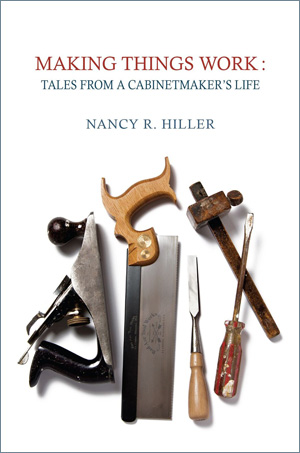 As cautionary woodworking tales go, Nancy R. Hiller’s might just be the funniest – and the most sincere.
As cautionary woodworking tales go, Nancy R. Hiller’s might just be the funniest – and the most sincere.
Standing in contrast to James Krenov’s “The Impractical Cabinetmaker” from 1979, Hiller’s new book, “Making Things Work: Tales from a Cabinetmaker’s Life,” is not about waiting for a particular plank of wood to tell you its true purpose. It is not an exhortation to fuss over each detail, no matter the personal cost. There is not a shop cat.
(Side note: I do love Krenov’s books, but they have not taught me squat about making a living.)
Instead, Hiller’s funny and occasionally ribald story is about a cabinetmaker who was trained to work at the highest level possible and how she has dealt with the personal anxiety that occurs when the desire and drive for excellence collides with paying the monthly bills.
The backdrop for “Making Things Work” is a cast of characters who could populate a Cohen brothers film – a Missouri furniture maker who masquerades as a Brit to impress his customers. A 30-something client and her older husband who seem hell-bent on cheating every trades worker in the Midwest. And Hiller’s British trainers, who through teasing, criticism and mockery finally let her know what “navy cake” really is.
At the center of it all is Hiller. She seeks to run an honest business, make beautiful things and be fairly paid. Doing all three things at once is an immense challenge, and she tells her odyssey in a series of vignettes that read like a modern-day Aesop’s fable. There is a lesson in each chapter about the craft, business or personal relationships. But it’s up to you to decode them. Her indirect approach is one of the great charms of the book.
If you are considering abandoning your cozy corporate job to make furniture, “Making Things Work” is required reading. It will illuminate you as to how difficult the profession can be. If you are undaunted after seeing the quality of Hiller’s furniture and reading about her struggle to make a living, perhaps you have a shot.
For amateur woodworkers, the book is a great read. Hiller is a fine and precise writer who knows exactly when to land a punch line (sometimes with a sledgehammer).
For those of you who appreciate the manufacturing quality of Lost Art Press books, “Making Things Work” will please you. Hiller used one of our printing vendors here in the United States. This is a book designed to last.
Most of all, kudos to Hiller for taking on this book like a piece of fine furniture. She managed most of it herself, from the writing to the production to the distribution.
“Making Things Work” is available from Hiller’s website here. Highly recommended.
— Christopher Schwarz